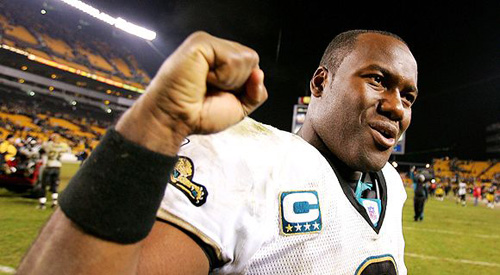
David Garrard’s Jacksonville exit
To the casual observer, it would look as though the Jacksonville Jaguars came full circle when they released David Garrard last week and replaced him with Luke McCown (not to mention first-year Blaine Gabbert). After all, it was Garrard who had taken over the Jaguars’ starting QB position just days before the beginning of the 2007 season when then-starter Byron Leftwich was suddenly cut.
Others might say it was a move of desperation for a coach on the hot seat and a team that keeps showing up on the list of candidates to move to Los Angeles. However, according to those who cover the team, the reality is much less dramatic. After a stellar first season, Garrard just burned out over his next few years and the Jaguars had finally had enough.
Alfie Crow is the co-host of CB Sports on ESPN Radio 1420 and covers the Jaguars for Big Cat Country. Crow said the decision to replace Garrard was mostly thanks to his ongoing poor performance in camp.
“David Garrard was let go because he struggled all through training camp and the preseason,” Crow said. “Coach Jack Del Rio had talked to Garrard and asked him to improve but the improvement never happened and the final straw was a terrible practice by Garrard on September 3, where he threw three interceptions. Jaguars GM Gene Smith did take the blame for the timing of the decision two days after it happened.”
Despite the surface similarities to the end of the Byron Leftwich era in Jacksonville, Crow sees them as very different situations.
[php snippet=1]
“Leftwich was released more so because of him clashing with Jack Del Rio, whereas David Garrard was released because he was simply outplayed by both other quarterbacks on the roster. If Garrard wasn’t going to start, they weren’t going to pay him $8 million to sit on the bench.”
In fact, the Jaguars might have parted ways with Garrard even earlier if not for the NFL lockout. The team didn’t want to, as Crow puts it, “force their hand” by putting pressure on Gabbert immediately with the labor stoppage going on. Crow believes that if the Jaguars hadn’t needed time to evaluate prized rookie Gabbert and determine how quickly McCown was recovering from tearing his ACL last season, Garrard might not have even made it to training camp.
It wasn’t always this way, of course. In his first season in 2007 after Leftwich was cut, Garrard threw for 2,509 yards, rushed for 185 more, scored 18 passing touchdowns, rushed for one touchdown and only threw three interceptions. That year, the Jaguars made the playoffs as a wild card team and upset the Pittsburgh Steelers on the road in the first round before losing to a New England Patriots team almost everyone assumed was going to win the Super Bowl anyhow.
Despite surpassing 3,000 yards passing the next two seasons, Garrard was never really able to fully repeat his 2007 consistency, though. He threw over three times as many interceptions in each of the next three seasons as he did in 2007. Money may have played into the decision to cut Garrard, but Crow said his poor performance was the bigger culprit.
“Garrard just wasn’t really that good,” Crow said. “He wasn’t able to see the field well and lacked pocket presence. Often, he would run when it wasn’t necessary and take sacks instead of throwing the football away. All in all, he was just limited by his overall ability.”
One difference between how the Jaguars handled their quarterback transition in 2007 and how they’re handling it now is their choice of immediate replacement. When the Jaguars released Leftwich, they made it clear Garrard was to be their permanent starter, even signing him to a seven-year, $60 million dollar contract extension in April 2008.
By choosing McCown to lead them into the 2011 season, the Jaguars are being much more pragmatic.
“The Jaguars chose to go with Luke McCown because they feel that right now, he gives the team the best chance to win,” Crow said. “It’s his third season in the offseason, so he should have no trouble running it. The team didn’t go with Blaine Gabbert because he’s simply not ready yet. While he’s flashed some things you expect to see from a future franchise quarterback, he’s also had plenty of moments where he looks like what he is; a rookie with six weeks of NFL practice.”
So far, that decision has paid off. The Jaguars won their first game of the season Sunday, and McCown completed 17 of his 24 passes (70.8 percent). Sure, he only threw for 175 yards and no touchdowns and Jacksonville only scored 16 points, but that was enough to beat Tennessee.
The most telling sign that Garrard had outstayed his welcome in Jacksonville is that nobody missed him, either before or during the game.
As Crow said before Jacksonville faced Tennessee, “The Jaguars players seem behind the decision and some that I have talked to wanted the decision to be made.”
It’s hard to see that changing soon following a win without Garrard. When a team has that little confidence in its own starting quarterback, maybe switching players less than a week before the first game of the season isn’t such a bad idea after all.
[php snippet=1]

